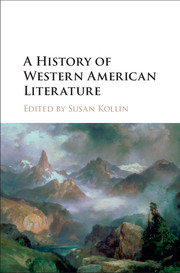Book contents
- Frontmatter
- Contents
- Notes on Contributors
- Acknowledgments
- Introduction: Historicizing the American Literary West
- PART I HOMELANDS
- PART II MAKING A REGION
- PART III GEOGRAPHIES OF THE LITERARY WEST
- PART IV THE TWENTIETH CENTURY AND BEYOND: LITERARY MOVEMENTS AND CRITICAL PERSPECTIVES
- 14 Early Cinematic Westerns
- 15 The Environmental Novel of the American West
- 16 Hard-Boiled Fiction and Noir Narratives
- 17 The Beats and the American West
- 18 Contested Wests: Indigenous Americans and the Literature of Sovereignty
- 19 Asian American Writers and the Making of the Western U.S. Landscape
- 20 African American Literature: Recasting Region through Race
- 21 Hollywood Westerns: 1930s to the Present
- 22 Urban New Wests
- 23 Queer Frontiers: Gender and Sexuality in the American West
- 24 Postwestern Literature and Criticism
- Selected Bibliography
- Index
16 - Hard-Boiled Fiction and Noir Narratives
from PART IV - THE TWENTIETH CENTURY AND BEYOND: LITERARY MOVEMENTS AND CRITICAL PERSPECTIVES
Published online by Cambridge University Press: 05 November 2015
- Frontmatter
- Contents
- Notes on Contributors
- Acknowledgments
- Introduction: Historicizing the American Literary West
- PART I HOMELANDS
- PART II MAKING A REGION
- PART III GEOGRAPHIES OF THE LITERARY WEST
- PART IV THE TWENTIETH CENTURY AND BEYOND: LITERARY MOVEMENTS AND CRITICAL PERSPECTIVES
- 14 Early Cinematic Westerns
- 15 The Environmental Novel of the American West
- 16 Hard-Boiled Fiction and Noir Narratives
- 17 The Beats and the American West
- 18 Contested Wests: Indigenous Americans and the Literature of Sovereignty
- 19 Asian American Writers and the Making of the Western U.S. Landscape
- 20 African American Literature: Recasting Region through Race
- 21 Hollywood Westerns: 1930s to the Present
- 22 Urban New Wests
- 23 Queer Frontiers: Gender and Sexuality in the American West
- 24 Postwestern Literature and Criticism
- Selected Bibliography
- Index
Summary
In the years following the First World War, a style of writing emerged that transformed expectations for a genre a little older than half a century: the detective or mystery novel. Hard-boiled fiction represented a newly terse, unsentimental fiction that displaced conventional narratives and customary styles, corresponding with the emergence of a tight-lipped aesthetic heralded by Hemingway and Dos Passos. Ever more graphic depictions of sex and violence would occur in shabby urban settings with a central figure given to unabashedly American turns of phrase. The slang-slinging, wisecracking gumshoe announced in his very self-presentation a rejection of traditional literary standards and established cultural values. What started out as cheap melodrama, written breathlessly words-per-minute, published by pulp magazines for a barely literate readership (people, as Mary McCarthy remarked, whose lips moved when they read), became transmuted into literary gold and cinematic masterpieces. Gradually, a set of sterile formulas and stock clichés grew into a genre that in multiple permutations would dominate the reading and viewing habits of the American middle class for nearly a century.
Hard-boiled narratives are not set exclusively in the American West or even in America itself, though the legacy of the western gunslinger adopting extralegal methods to right social wrongs is certainly discernable in the figure of a private investigator walking mean city streets. And earlier small-town confrontations between bullying outlaws and a craven citizenry are recognizable in hard-boiled narratives that simply shift the action to corrupt urban precincts. Now a solitary figure traverses his metropolitan setting in an automobile not on a horse, and more often than not finds himself (unlike his cowboy avatar) morally impugned by the world he traverses. That such a largely urban, largely compromised vision should have emerged in the 1920s comes as little surprise in the aftermath of a global war in which conventional ideals and language seemed inadequate to events. But the confluence of separate developments – of a publishing industry in transition, of notable writers able to transfigure tired materials, of a western landscape urbanized with unseemly speed, and of a literary shift to new modes of representation – all contributed to a hard-boiled vision that soon modulated into more sophisticated noir fictional modes.
- Type
- Chapter
- Information
- A History of Western American Literature , pp. 256 - 269Publisher: Cambridge University PressPrint publication year: 2015



